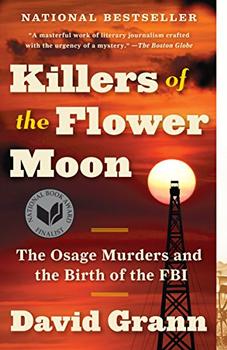Summary | Excerpt | Reviews | Beyond the Book | Readalikes | Genres & Themes | Author Bio

The Osage Murders and the Birth of the FBI
by David Grann
Anna continued raising Cain. She fought with the guests, fought with her mother, fought with Mollie. "She was drinking and quarreling," a servant later told authorities. "I couldn't understand her language, but they were quarreling." The servant added, "They had an awful time with Anna, and I was afraid."
That evening, Mollie planned to look after her mother, while Ernest took the guests into Fairfax, five miles to the northwest, to meet Hale and see Bringing Up Father, a touring musical about a poor Irish immigrant who wins a million-dollar sweepstakes and struggles to assimilate into high society. Bryan, who'd put on a cowboy hat, his catlike eyes peering out from under the brim, offered to drop Anna off at her house.
Before they left, Mollie washed Anna's clothes, gave her some food to eat, and made sure that she'd sobered up enough that Mollie could glimpse her sister as her usual self, bright and charming. They lingered together, sharing a moment of calm and reconciliation. Then Anna said good-bye, a gold filling flashing through her smile.
With each passing night, Mollie grew more anxious. Bryan insisted that he'd taken Anna straight home and dropped her off before heading to the show. After the third night, Mollie, in her quiet but forceful way, pressed everyone into action. She dispatched Ernest to check on Anna's house. Ernest jiggled the knob to her front door—it was locked. From the window, the rooms inside appeared dark and deserted.
Ernest stood there alone in the heat. A few days earlier, a cool rain shower had dusted the earth, but afterward the sun's rays beat down mercilessly through the blackjack trees. This time of year, heat blurred the prairies and made the tall grass creak underfoot. In the distance, through the shimmering light, one could see the skeletal frames of derricks.
Anna's head servant, who lived next door, came out, and Ernest asked her, "Do you know where Anna is?"
Before the shower, the servant said, she'd stopped by Anna's house to close any open windows. "I thought the rain would blow in," she explained. But the door was locked, and there was no sign of Anna. She was gone.
News of her absence coursed through the boomtowns, traveling from porch to porch, from store to store. Fueling the unease were reports that another Osage, Charles Whitehorn, had vanished a week before Anna had. Genial and witty, the thirty-year-old Whitehorn was married to a woman who was part white, part Cheyenne. A local newspaper noted that he was "popular among both the whites and the members of his own tribe." On May 14, he'd left his home, in the southwestern part of the reservation, for Pawhuska. He never returned.
Excerpted from Killers of the Flower Moon by David Grann. Copyright © 2017 by David Grann. All rights reserved. No part of this excerpt may be reproduced or reprinted without permission in writing from the publisher.
Your guide toexceptional books
BookBrowse seeks out and recommends the best in contemporary fiction and nonfiction—books that not only engage and entertain but also deepen our understanding of ourselves and the world around us.